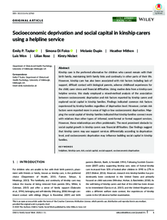Displaying 351 - 360 of 1138
This guidance from the UK Department for Education outlines actions to be taken by educational providers - working together with other partners, where relevant, such as local authorities - to meet the needs of vulnerable children and young people during the COVID-19 pandemic.
In this online event, Family for Every Child members FSCE (Ethiopia), The Mulberry Bush (UK), Praajak (India) and CSID (Bangladesh) discussed children's care in the context of COVID-19.
"The [UK] government could face legal action after ministers used the coronavirus crisis to remove protections for children in care," says this article from the Huffington Post.
This article explores the important increase in awareness surrounding the care-crime connection (the over-representation of care-experienced individuals in criminal justice settings) in recent years.
This blog post from Strengthening Families For Abandoned Children (SFAC) features a decision map and accompanying guide to making decisions about where and how to place a child during a large-scale emergency, like the COVID-19 pandemic.
Using routine data from a kinship care helpline service, this study employed a mixed‐method analysis of the association between socioeconomic deprivation and risk factors reported by kinship carers in the UK and explored social capital in kinship families.
The UK government has introduced several changes to legal protections for children in care as an emergency response to the coronavirus crisis, which, according to this article from the Guardian, children’s rights campaigners and activists are condemning.
"A statutory instrument published this afternoon makes unprecedented changes to regulations (secondary legislation) relating to the care and protection of vulnerable children and young people," says this news item from Article 39, an organization that fights for the rights of children living in state and privately-run institutions (children’s homes, boarding and residential schools, mental health inpatient units, prisons and immigration detention) in England.
Using 20-year follow-up data from a unique natural experiment – the large scale adoption of children exposed to extreme deprivation in Romanian institutions in the 1980s – the authors of this paper examined, for the first time, whether such deficits are still present in adulthood and whether they are associated with deprivation-related symptoms of attention-deficit/hyperactivity disorder (ADHD) and autism spectrum disorder (ASD).
This article interrogates formal public evaluations of extended care programmes with a particular focus on their eligibility criteria that have determined which groups of care leavers are included or alternatively excluded and the identified strengths and limitations of the programmes.

